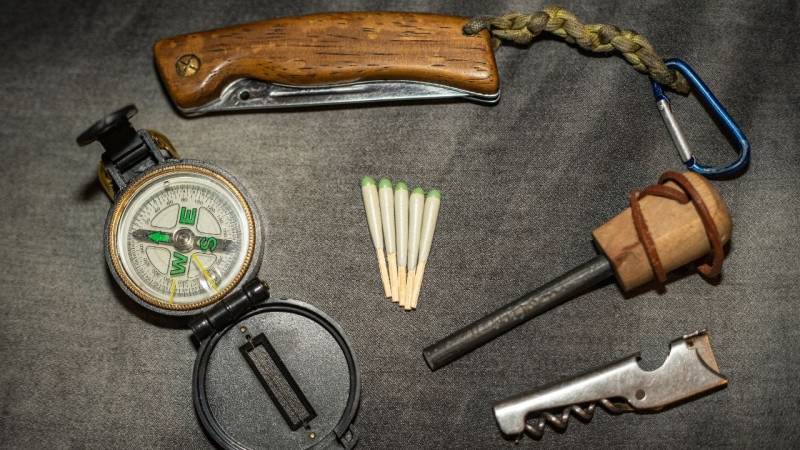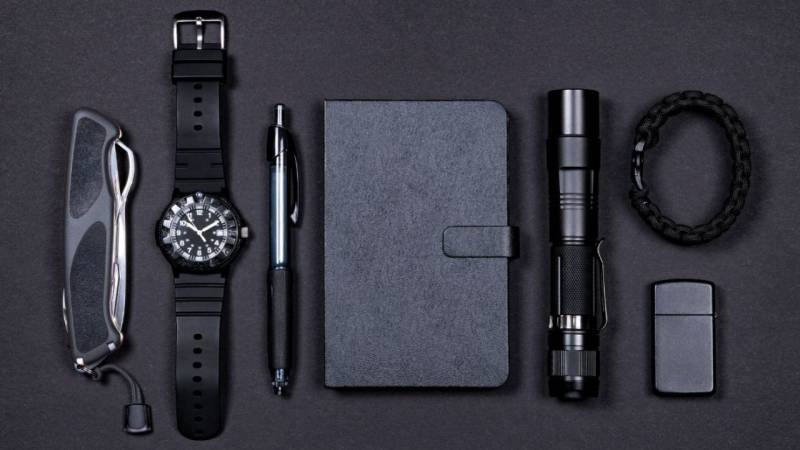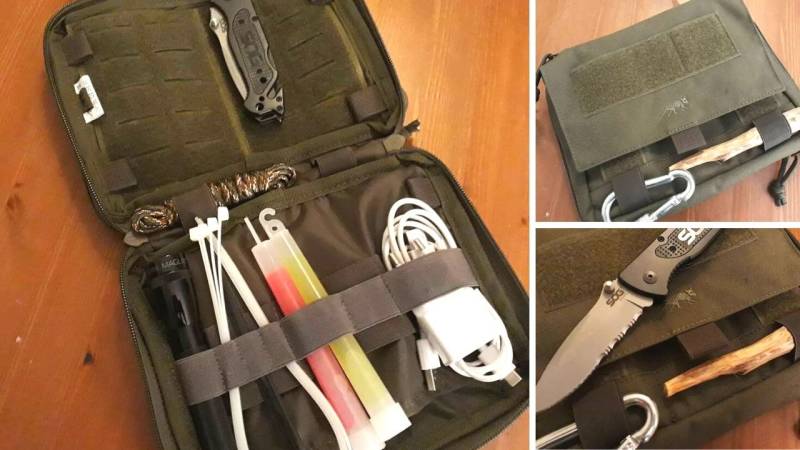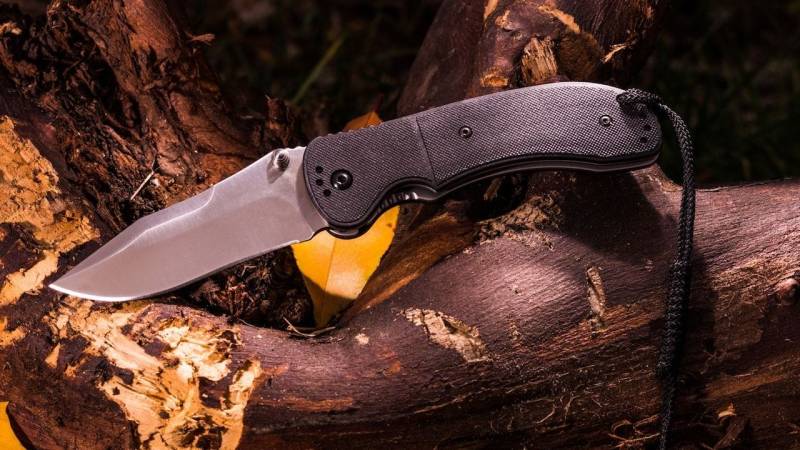
What is an EDC? What belongs in an EDC kit inside?
👉 The key facts from this guide
- EDC stands for Everyday Carry and refers to a collection of items that you carry with you daily to deal with everyday problems or emergencies.
- An EDC can include tools such as a pocket knife, a multi-tool, a flashlight, a lighter, and a smartphone. It can also include specific items tailored to your personal needs and lifestyle.
- An EDC helps you efficiently solve problems, become more independent of others, and easily help others.
- The selection of items in your EDC should be based on your region, climate, work, and hobbies. The quality and versatility of the items are also important factors.
- You must know how to efficiently and safely use the items in your EDC. The knowledge and skills you possess are just as essential as the items themselves.
What if you always had the right tool for almost every situation at hand?
That would be great, wouldn't it? You would be the modern-day MacGyver.
In fact, this is possible with the right items, which you always carry with you - even in everyday life.
I'm talking about an EDC.
In this guide, I want to clarify what an EDC actually is and what belongs in it.
What does EDC mean?
For those who are new to outdoor and survival topics, the abbreviation EDC will quickly come up. What is an EDC?
EDC stands for Everyday Carry. An Everyday Carry describes a small collection of items that are carried for coping with everyday problems or emergencies. EDC means "things you carry with you daily".
Look, I conducted a small survey. Most people who own an EDC always carry it with them.

Why it makes sense to own an EDC kit
There are several reasons that speak for owning an EDC. Check them out:
- Efficient issue solving: Tools and equipment massively support you in a difficulty situation. For example, a knife is a very versatile tool that gives you a huge advantage in many difficulty situations.
- Be prepared: With an EDC kit, you are well-prepared for a variety of issues that would be difficult or impossible to solve without your EDC.
- Independence: With an EDC, you are less dependent on others and therefore less reliant on outside help.
- Support: By carrying your equipment with you, you can help other people quickly and easily. Does someone need fire? Does someone require light? Then you are there to help.
- Safety: Even if you don't need your EDC equipment, it still provides a sense of security. You are well-prepared for many situations.
What belongs in an EDC?
Most EDCs contain a selection of the following items:
Pocket knife
A knife is simply practical. You can use a knife in many ways. Cutting, carving, splitting - and even as a weapon for self-defense (find all legal weapons for self-defense here). Be aware of knife laws and make sure you do not enter an illegal zone. My detailed knife law guide presents all types of knives.
Multi-tool
A multi-tool combines many tools in one. Knife, screwdriver, pliers, can opener, bottle opener, saw, ruler. A good multi-tool will accompany you for your entire life.
Flashlight
A flashlight is essential in the dark. Without light, you are lost. Get a compact flashlight with a lot of brightness.
Lighter
With a lighter, you can quickly light a fire, and you can also cut ropes if you don't have a knife.
Smartphone
Your smartphone is a mini-computer that is 100 times more powerful than the computer in the rocket that flew to the moon. The Emergency call function, camera, and GPS are fantastic functions. Furthermore, make sure you have all the necessary apps installed, for example, to determine edible plants.
Tool card
A tool card combined with a knife replaces the multi-tool. A tool card combines screwdrivers, wrenches, a ruler, can opener, bottle opener, a saw.
Pen and paper
A pen with a notepad also makes sense for your notes. Maybe a tactical pen is also useful for you? This is a writing instrument that saves lives in an emergency through the glass breaker function.
Watch
Your watch is, of course, on your wrist. Ideally, it works without electricity and has hands. Then the cardinal directions can easily be determined. With this method, you can easily orient yourself without a compass.
String
A bit of cord can be very useful. Whether your shoelace is torn or you need to build a deadly trap in a survival situation. It's best to take some paracord with you.
Compass
If you're out in the wilderness, it's better to take a compass with you to navigate efficiently. There are excellent models that are lightweight and small.
Firesteel
If you would rather not rely on your lighter, grab a Firesteel - it lasts forever. But remember: you must know how to light a fire with a Firesteel and bring or find suitable tinder.
Magnifying glass
A magnifying glass is an exquisite tool for starting a fire. And the best thing is that there are credit card-sized magnifiers (with a ruler). At the same time, you can also use a magnifying glass to see things magnified. Take a look at my 8 magnifying glass tips that you should follow.
Survival bracelet
As an alternative to a rope, you can strap a paracord bracelet around your wrist. This way, you'll have access to a high-quality rope in emergencies. Many survival bracelets also have other features, but these are often of inferior quality and don't work correctly (e.g., the compass). Read all about survival bracelets in my guide.
Plasters
If you frequently cut yourself or your children typically get injuries, then a small plaster set makes sense.
Power bank
A power bank can be useful if you're separated from power sources for an extended period and can't live without your smartphone. Take a look at my buying guide and list of top picks here.
Pepper spray
If you feel regularly threatened, pepper spray could be helpful and provide security. However, remember that it can also be used against you.
There are no set rules or "must-haves" for an EDC.
The EDC is explicitly not a survival kit, although there may be material overlaps.
Here's the critical difference between an EDC and a survival kit: An EDC is a highly personalized set of objects tailored exclusively to the owner's everyday needs.

What is essential for one user can be largely useless for another. So, a banker in Frankfurt am Main will have an entirely different EDC than a forestry worker in the Bavarian Forest.
Now, I would like to show you two examples of how an EDC can be structured:
The Urban EDC
- Multi-Tool (e.g., Victorinox Swiss Tools SwissTool X Plus Ratchet in leather case)
- Toolcard (e.g., Lever Gear Toolcard Pro)
- Lighter (I swear by BIC Lighters)
- Flashlight (e.g., Fenix LD22)
- Charging cable for smartphone
- Pen and notepad
- Survival bracelet (e.g., the STEINBOCK7® Survival Bracelet 16-in-1)
The Outdoor EDC
- Folding knife or pocket knife (e.g., the SOG Escape or the Victorinox Huntsman (read my review))
- Multi-tool (e.g., the Leatherman Multi-Tool Signal)
- Fire starter (e.g., Light my Fire, read my review here)
- Tinder, such as Fatwood or other natural materials (check out tinder examples here)
- A few meters of Paracord (What is Paracord?)
- Headlamp (e.g., Petzl Headlamp Tactikka)
- Spare batteries
Of course, you may combine items based on your needs. Most EDC users refine their perfect companion over the years.
What should I consider when assembling my EDC kit?
When assembling your kit, here are a few tips to keep in mind:
Pay attention to the following:
- Region and Climate: Where do you live? What kind of weather conditions prevail there? If the sun shines strongly, then sun protection makes sense in your EDC. If it often rains, then a poncho is probably useful.
- Work and Hobbies: Do you like to work on your bike? Then an Allen key set is most likely very useful. Or if you typically deal with cardboard boxes at work, then pack a box cutter in your EDC kit.
- Quality: You may know the saying: "Buy cheap, buy twice". Unfortunately, this is frequently true for tools and equipment. So, it's better to save up a little longer and get high-quality equipment right away. After all, your EDC is your emergency kit, and you can't afford to make mistakes then.
- Versatility: Make sure that your items are universally usable. With a flashlight, you can not only light your way out. However, you can also Morse SOS signals, blind someone, or start a fire with batteries.
What should not be included?
This question can be answered very simply:
Anything that is very atypical for your everyday life or is already covered by other parts of your EDC should not be included.
You do not need a second pair of scissors if you already have one in your pocket knife.
An EDC should ideally be space-saving and light.
Also read
15 critical EDC mistakes to avoid - You never know what's around the corner, but you can be prepared for it. We highlight 15 mistakes to avoid when it comes to your EDC.
How should I transport my equipment?
There are solutions aplenty to this question. Of course, well-known manufacturers like Tasmanian Tiger (TT) offer excellent bags for this purpose.
One example is the relatively large TT EDC Pouch. It is made of water-repellent Cordura (nylon) and provides enough room for a variety of equipment. TT is mainly used in the outdoor area.
For those who want something smaller and more fashionable for the urban jungle, the VIPERADE VE1 Pocket Organizer is a suitable option. You'll find plenty of comparable bags to choose from.

An EDC is only as good as its user
Now I've told you the most important facts about EDC.
But I want to leave you with something:
You have to be able to use the equipment in your EDC.
Knowledge is Power, and it’s very lightweight.
– Cody Lundin
You obviously know how a flashlight works. No question.
But do you also know how to handle a knife safely? Or how to hand it over to others without risk? Did you know that there are carving techniques that lead towards the body but are still safe?
Or do you know how to start a fire without a lighter or matches?
What I mean is:
Acquire the skills and techniques for your tools.
If you don't know how to use a tool, it may be useless in an emergency or in urban survival situations.
And when I say "use," I mean using your equipment safely and efficiently.
Take a look around survival-compass.com, there are plenty of practical guides here, like my guide "11 underestimated survival skills in the city".

If you already have an EDC, please let us know which items accompany you on your daily adventures.
If you don't carry an EDC yet, this post will hopefully be helpful to you.
Do you already have an EDC, or are you planning to get one?


Author of the guide
Martin Gebhardt
Hey, I'm Martin. On my blog, you will learn the basics and numerous details about living in the wild. I think survival, bushcraft and the good life in nature are the keys to happiness. Find me here on Instagram or on YouTube. You can find more about my mission on the About Me page.
Was this guide helpful?
65 people found this guide helpful.
4.94 out of 5 points (66 Ratings)
Comments (0)
This post may contain affiliate links. So if you click on the links and make a purchase, I will receive a small commission at no additional cost to you. Click here, to learn more about it.


